The Intel Core i9-9990XE Review: All 14 Cores at 5.0 GHz
by Dr. Ian Cutress on October 28, 2019 10:00 AM ESTCPU Performance: Encoding Tests
With the rise of streaming, vlogs, and video content as a whole, encoding and transcoding tests are becoming ever more important. Not only are more home users and gamers needing to convert video files into something more manageable, for streaming or archival purposes, but the servers that manage the output also manage around data and log files with compression and decompression. Our encoding tasks are focused around these important scenarios, with input from the community for the best implementation of real-world testing.
All of our benchmark results can also be found in our benchmark engine, Bench.
Handbrake 1.1.0: Streaming and Archival Video Transcoding
A popular open source tool, Handbrake is the anything-to-anything video conversion software that a number of people use as a reference point. The danger is always on version numbers and optimization, for example the latest versions of the software can take advantage of AVX-512 and OpenCL to accelerate certain types of transcoding and algorithms. The version we use here is a pure CPU play, with common transcoding variations.
We have split Handbrake up into several tests, using a Logitech C920 1080p60 native webcam recording (essentially a streamer recording), and convert them into two types of streaming formats and one for archival. The output settings used are:
- 720p60 at 6000 kbps constant bit rate, fast setting, high profile
- 1080p60 at 3500 kbps constant bit rate, faster setting, main profile
- 1080p60 HEVC at 3500 kbps variable bit rate, fast setting, main profile
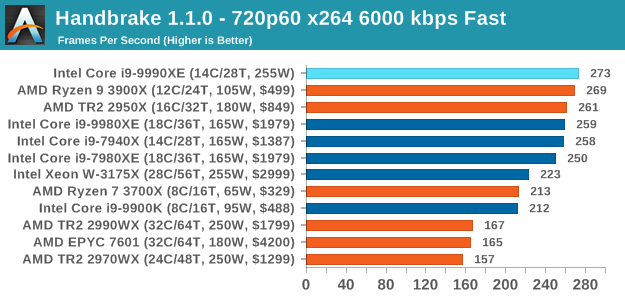
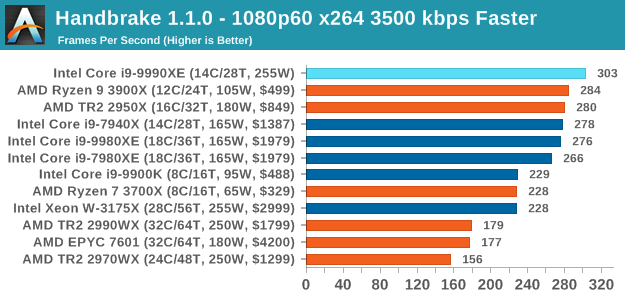
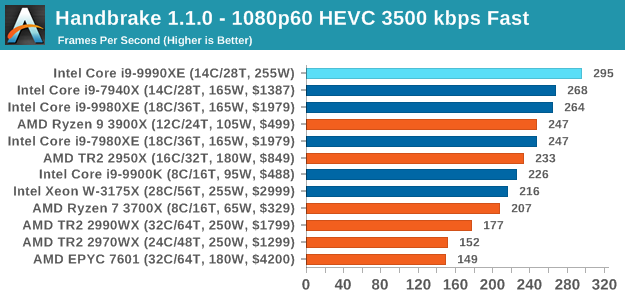
Our encoding tests require a good balance of cores and frequency, and the 5.0 GHz 14-core hardware easily pulls ahead of the 7940X, and shows that having 28 cores isn't always a good thing.
7-zip v1805: Popular Open-Source Encoding Engine
Out of our compression/decompression tool tests, 7-zip is the most requested and comes with a built-in benchmark. For our test suite, we’ve pulled the latest version of the software and we run the benchmark from the command line, reporting the compression, decompression, and a combined score.
It is noted in this benchmark that the latest multi-die processors have very bi-modal performance between compression and decompression, performing well in one and badly in the other. There are also discussions around how the Windows Scheduler is implementing every thread. As we get more results, it will be interesting to see how this plays out.
Please note, if you plan to share out the Compression graph, please include the Decompression one. Otherwise you’re only presenting half a picture.
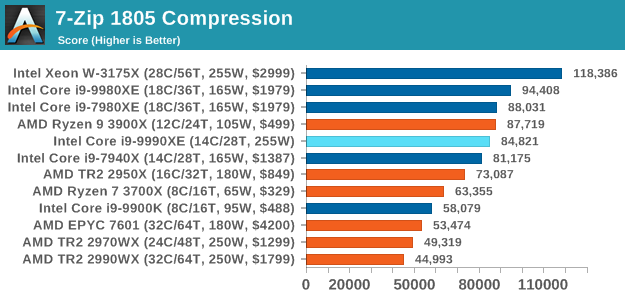
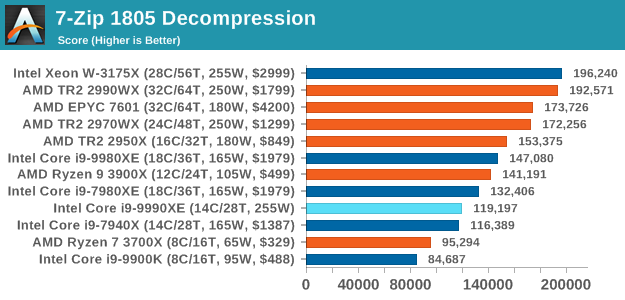
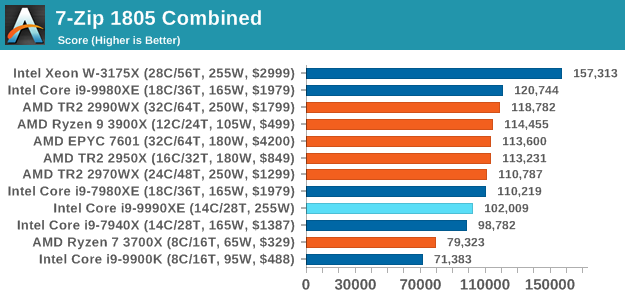
This is where having 28-cores helps, as the extra frequency can't beat some extra cores.
WinRAR 5.60b3: Archiving Tool
My compression tool of choice is often WinRAR, having been one of the first tools a number of my generation used over two decades ago. The interface has not changed much, although the integration with Windows right click commands is always a plus. It has no in-built test, so we run a compression over a set directory containing over thirty 60-second video files and 2000 small web-based files at a normal compression rate.
WinRAR is variable threaded but also susceptible to caching, so in our test we run it 10 times and take the average of the last five, leaving the test purely for raw CPU compute performance.
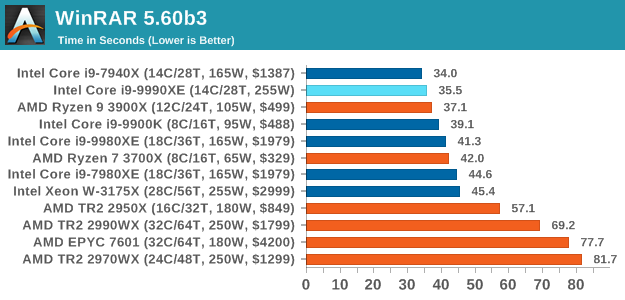
WinRAR is one of our variable threaded tests, so here a mix of cores and frequency helps. Interestingly enough, the 9990XE despite with the higher frequency is slightly slower than the 7940X - this might be a function of the test getting too fast, or the fact that the extra power needed to drive up the cores to peak frequency might be causing additional delays with all the small files.
AES Encryption: File Security
A number of platforms, particularly mobile devices, are now offering encryption by default with file systems in order to protect the contents. Windows based devices have these options as well, often applied by BitLocker or third-party software. In our AES encryption test, we used the discontinued TrueCrypt for its built-in benchmark, which tests several encryption algorithms directly in memory.
The data we take for this test is the combined AES encrypt/decrypt performance, measured in gigabytes per second. The software does use AES commands for processors that offer hardware selection, however not AVX-512.
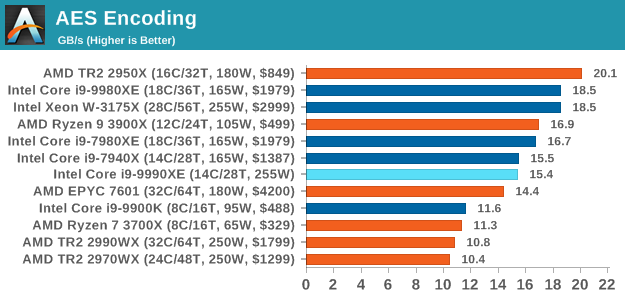










145 Comments
View All Comments
AshlayW - Monday, October 28, 2019 - link
Agreed. This product is a pathetic attempt to push their slight advantage in single-core, and justify the obscene pricing too. It's disgusting, really, tech press seem to lap up these things without understanding that this product is, well, pointless.Intel made like 5 of them. So, AMD could bin a 3950X so damn effectively, you can have 4.7 on all 16-cores, because trust me with that level of binning; it's possible. But they won't, because they actually have people buying thier silicon for datacentres.
Anyway, the ST performance isn't even that much higher. Nothing worth the obscene price. I'll wait for the 3950X, and hope AT will sing its praises as it will likely demolish Intel's entire HEDT at a lower price and half the power use - it's only fair.
xrror - Monday, October 28, 2019 - link
Guys, seriously...I'm an AMD person myself, but give Intel some credit - I doubt (sadly) that AMD could even release a Ryzen 5Ghz base clock part right now. Granted they might be able to bin out a 4.7 one but....
2nd, everyone going on and on about how expensive the 9990XE. Like it's under $3000? That's stupid cheap! Historically these HPC chips are like 1 or 2 cores enabled out of 12 and you pay over 5 or 10grand for them. Look up the old socket 1366 HPC chips like Xeon X5698 some time!
http://www.cpushack.com/2018/07/03/cpu-of-the-day-...
Korguz - Monday, October 28, 2019 - link
" Like it's under $3000? That's stupid cheap! " maybe in your world.. but for the rest of us, that is stupid expensive.xrror - Monday, October 28, 2019 - link
It is stupid cheap for a halo professional performance part from Intel. But even a cheap HPC - $3000 proc - it is more money than I could ever justify personally spending for what would essentially be a glorified gaming rig.Which means, we're not the target market. Even in your world.
Retycint - Monday, October 28, 2019 - link
The whole point of this chip is that it throws price-to-perf out of the window for highest possible ST perf sustainable on all-cores. You know, like what the article describes?But sure, AMD has better value or something, so everyone that buys Intel is stupid, despite the fact that different people have different usage scenarios and, gasp, Intel performs better under certain cases
FreckledTrout - Monday, October 28, 2019 - link
This was fun to read even if it is akin to describing what a brown unicron looks like.airdrifting - Monday, October 28, 2019 - link
Everytime there is a worthless product from Intel or Apple you always see fan boys and smart ass trying to defend it.Single threaded 9900K >=
Multi threaded 2990WX, maybe even 3950X >
1_rick - Monday, October 28, 2019 - link
If you click the link to Case King, they've cut the price to 1799EUR/1996USD (at today's rates).29a - Monday, October 28, 2019 - link
Please get rid of the 3DPM and FCAT benchmarks, the article even admits they are both poorly written.MrSpadge - Monday, October 28, 2019 - link
Ian, what happened to your appetite for chips? Are you ill or is this toasty piece of egineering not tempting enough?